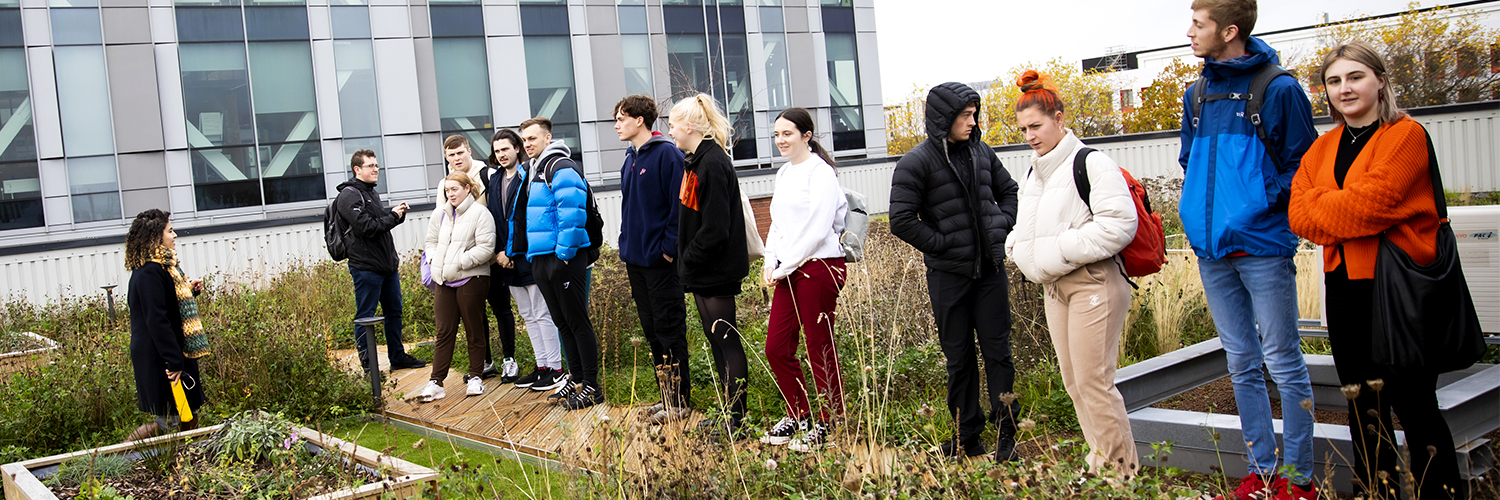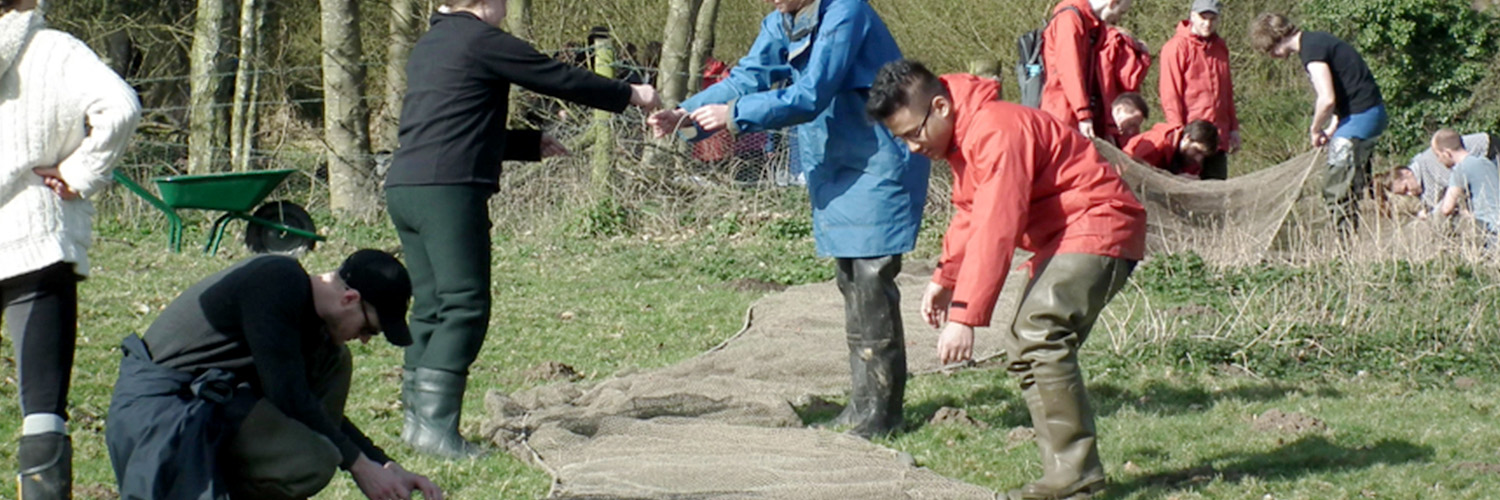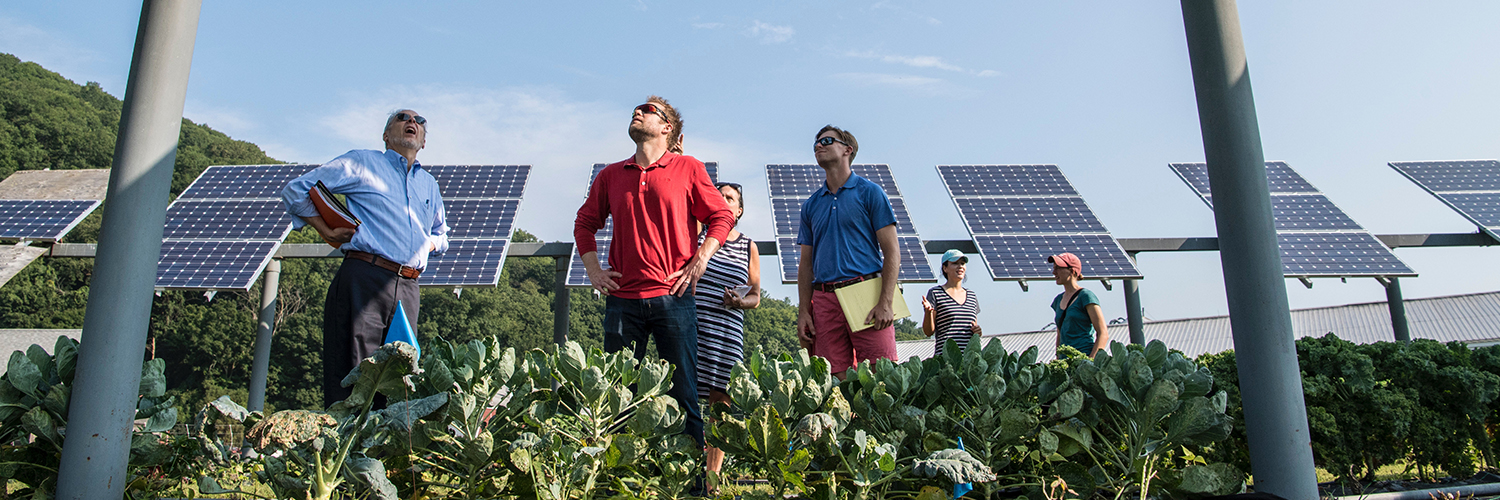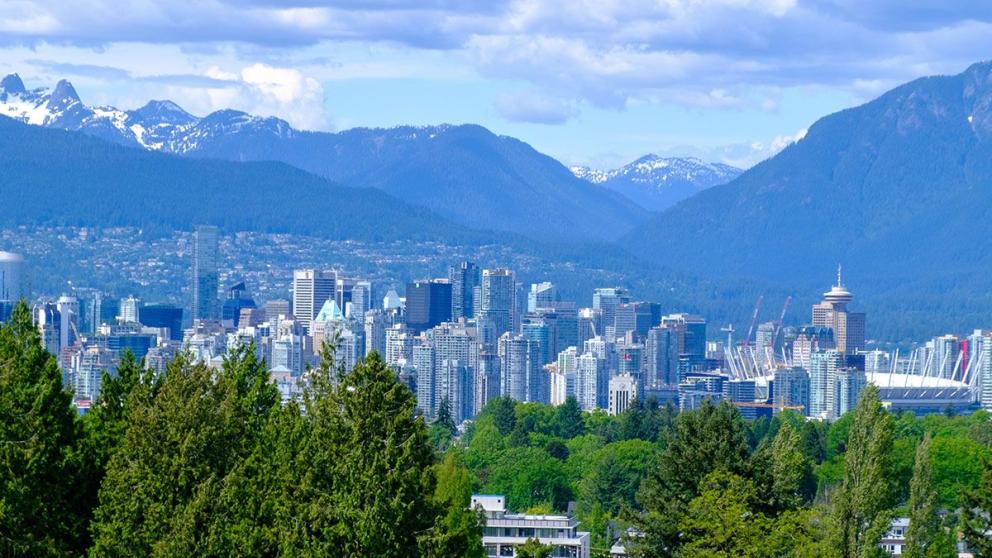
Geography
Full-time
Part-time
With placement
Three year
Six year
Four year
September 2026
In a nutshell
Mitigating climate change and enhancing sustainability are vital to the survival of the human and natural world. Delivered in a dynamic and engaging way, our BSc (Hons) Geography degree will build your understanding of the processes that shape the environment and how humans respond to an ever-changing world.
Accredited by the Royal Geographical Society, our course is designed to immerse you in human and physical geography. Across a range of carefully-designed modules packed with real-world relevance, you will have the option to focus on human geography, physical geography, or a combination. Led by research-active practitioners, you'll have options to learn about climate change and its effect on people and places, explore glaciers and global water resources, study fluvial processes and river restoration, and explore sustainability management strategies underpinning the greening of cities, transport geography, planning and beyond.
Fieldwork is at the heart of your learning. We've aligned trips with specialist modules, so you develop applied skills and gain practical experiences that reinforce your knowledge. Typical destinations include the Peak District, the Yorkshire Dales, Sheffield and Liverpool. You'll also experience residential field courses across the UK and other international locations - recent trips have taken us to Scandinavia, Barcelona and other destinations. A unique feature at Salford is that the cost of your field trips is covered by your tuition fees, so that all geography students are able to enjoy them. You can also include a placement to boost your real-world experience.
Salford ranks 8th on People & Planet's University League
People & Planet is the largest student network in the UK campaigning for social and environmental justice. They envision a future in which spiralling inequality, instability, climate crisis and resource depletion are reversed, and a world in which the balance of power in society has fundamentally shifted to an equal world that benefits all of us. University of Salford scored 71.0% and ranked 8th in the University League, with our highest scores in Managing Carbon, Staff and Student Engagement and Education for Sustainable Development.
This programme has been accredited by the Royal Geographical Society (with IBG).
Start your study journey
Register for our next Open Day to learn more about studying geography, explore our facilities and meet the course team
You will:
- Learn about a range of topics, from climate change, glaciers, fluvial processes and river restoration to urban planning, radical sustainability and much more depending on your preferences for human geography, physical geography or a combination of the two
- Gain real-world, hands-on experience as you participate in fieldwork trips
- Build a strong skillset as you benefit from a small group teaching approach
options available
students accepted
Course accreditations
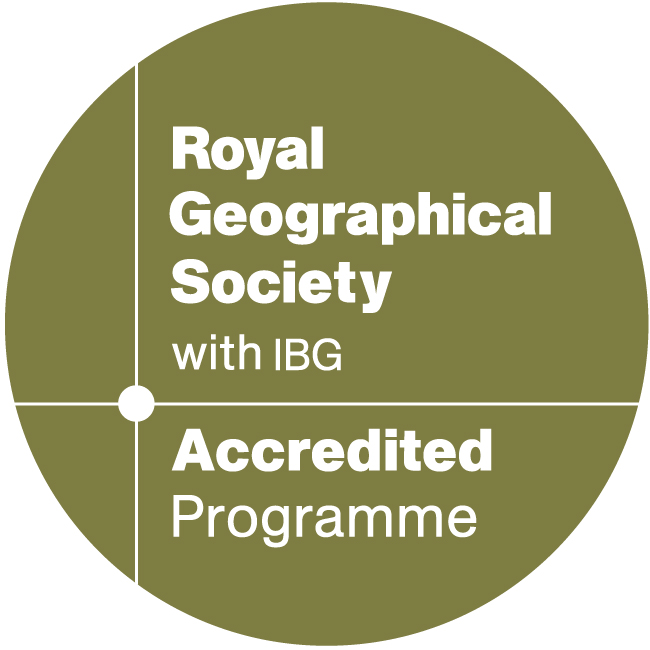
This is for you if...
You're passionate about the world around you and want a degree with fieldwork
You want to study human geography, physical geography or a combination of the two
You want opportunities to develop practical and technical skills and experience a broad range of field trips
All about the course
Course delivery
For three years of study - or four, if you choose to include an industry placement, you will develop a comprehensive range of geography-focused knowledge and skills. You'll take core modules focusing on areas such as sustainability, natural resources, earth processes and the impact of people on places, while building your practical skills through field work.
You'll also have the opportunity to build specialised knowledge in areas such as geographical information systems (GIS), river management, mitigating climate change and sustainable cities among others.
Learn more about the course modules in the section below.
Learning experience
Fieldwork is a key element of this course, and trips are aligned with the specialist modules to develop applied skills and gain practical experience. Residential field trips take place in the UK and the European Alps. Typical day trip destinations include the Peak District, the Yorkshire Dales, and cities such as Sheffield and Liverpool.
Embedding collaboration with industry and working on real-world projects is another essential aspect of studying the BSc (Hons) Geography degree at Salford. In your second year you'll have the option complete a group consultancy project, where you'll work on a live brief, set by one of our industry partners, to solve a real-world environmental problem.
Read about Abigail's first year as a Geography student
Industry Placement
On this Geography degree course, you will have the opportunity to take an industrial placement year between years two and three. Although you will be responsible for securing your own placement, we will assign you a placement tutor to monitor your progress and assess your final report.
By completing a placement year, you can add 'with placement' to your degree award. Industry placements are an excellent way to enhance your CV, gain hands-on work experience and build industry connections.
Earth Surface Processes
The Earth Surface Processes module explores the landscape in which we live, work and play, and considers the future trajectory of earth surface processes in the light of the Climate Crisis. We evaluate the influence of the properties of rock and soils on the operation of slopes, rivers and the coast, then look at the biogeography of the UK; past, present and future.
The learning environment includes fieldwork (both in-person and virtual) to develop field and analytical skills in soils, geomorphology and palaeoscience) to provide a holistic view of environmental challenges and the tools to tackle their environmental management.
Environmental Resources
Environmental resources such as food, energy, water and minerals are essential to development across the globe, yet the availability of these resources is not equally shared and, in some cases, not unlimited. This makes the variation in the availability of these resources one of the most important issues for society in the twenty-first century.
This module introduces the fundamental topics in environmental resources through a set of historical and contemporary environmental ‘crises’ related to climate change, food security, water availability and pollution and examines some of the global, national and local responses these crises.
Through an active learning process, you will explore the challenges faced by society and participate in site visits, field trips and laboratory work.
People, Place and Space
People, Place and Space is a rich module that introduces students to the human dimension of geography. Lectures will discuss contemporary themes to understand the socio-economic changes and evolution that our society has experienced in this last century. The module will start exploring topics such as urbanisation, industrialisation, globalisation and development, to then look at socio-cultural themes such as gender, identity, ageing, health and sexuality. It will finally conclude investigating the human dimensions of sustainability, disasters and climate change.
While studying this range of topics through the lenses of human geography, students will strengthen their critically skills, learn to meaningfully construct an argument and to discuss confidently about these world issues.
Sustainability and Environment
Environmental resources such as food, energy, water and minerals are essential to development across the globe, yet the availability of these resources is not equally shared, nor is it unlimited. This makes the variation in the availability of these resources arguably one of the most important issues for society in the twenty first century.
This module introduces the fundamental topics in environmental resources through a set of historical and contemporary ‘crisis’ in the environment related to climate change, food security, water availability and pollution and examines some of the global, national and local responses these crises.
Academic Tutorial
The Academic Tutorial module supports your transition to university by developing your academic, personal and professional skills to prepare you for study and work. Lectures will focus on topics such as referencing, academic writing, understanding feedback and career planning. There will also be opportunities to work with your peers in small group tutorials and get involved in volunteering. Your assignments focus on a range of geographical/environmental management issues linked to the other core first year modules. As well as the weekly lectures, you will also attend one-hour tutorials with a member of academic staff from the department, these involve discussion, debate and problem solving, as well as regular monitoring of your personal progress throughout the first year.
Applied Skills and Field Course
The Applied skills and fieldwork module provides lectures and associated practical activities (in trimester 1) to identify and source data, describe, and utilise environmental statistics to develop writing and analytical skills associated with spatial and temporal variations in real world data.
In Trimester 2 lectures investigate the role of qualitative research methods and build background detail before the residential field course takes place. Post field course sessions provide opportunities for feedback, questions and guidance before the final assessment. This module introduces water, glaciers, climate change and a mixed methods approach to both desk and field based activities. You will explore these themes through a combination of lectures, practical computer lab sessions and field work.
Geographical Information Systems and Science
This module introduces you to the theory and practical implementation of Geographical Information Systems (GIS) to solve environmental and geographical problems. The module will explore the principles relating to how we represent the world inside a computer, before looking at the analytical methods that can be applied to solve spatial problems. You will learn how to be a critical user and how to design and implement solutions using industry standard GIS software. Part of the module is delivered in conjunction with industry partners.
Research in Action
Research in Action is a dynamic module that runs in both trimesters of the second year. This module provides students with the theoretical knowledge to undertake an independent research project by studying key methods used in social science research. Once the theoretical basis has been delivered, students will be able to conduct their own research project working in small groups on key contemporary geography topics. Thus, the module provides students with the practical fieldwork skills to design and plan a dissertation project and develop life-long learning skills. In trimester 2 students will have also the opportunity to enhance their research skills by visiting another country and conducting a residential week international field trip.
Environmental Protection
This module provides a comprehensive understanding of planning and regulatory frameworks, highlighting their crucial role in promoting environmental sustainability. Through a blend of lectures, workshops, and hands-on field and laboratory work, you will engage with real-world case studies in areas such as planning, contaminated land management, and noise regulation. These case studies will help you explore the complex interplay between regulatory frameworks, environmental standards, and decision-making processes in sustainable development.
Choose two options from the following:
Consultancy Project
This is an exciting module that will help you develop your personal and professional skills. You will work in a small group to complete a project for a real external client. You will develop key skills such as teamwork, project planning, time management and communication. As a group, you will work with an academic supervisor who will support you in planning the project, allocating tasks, carrying out the work and reporting the results to a client. There is also a conference that is organised on campus where you will present your work to your client. The conference is a great opportunity to network with clients.
Monitoring Environmental Change
This module provides a research led introduction to some of the techniques used to assess and evaluate the changing and challenging conditions our planet is experiencing. Through a suite of integrated lectures, fieldwork, laboratory and IT sessions you will experience the approaches and strategies used to monitor human impacts on the environment in abiotic (non-living e.g., soils and sediments) and biotic (living) contexts and the use of Geographical Information Systems (GIS) to integrate patterns and processes in environmental data. The module is assessed through the practical application of such techniques working on regional examples with local conservation bodies.
University Wide Language
Courses are available in: Arabic, German, French, Italian, Japanese, Mandarin Chinese and Spanish.
Coastal Management
This module will engage you in some of the most challenging marine management problems currently faced as well as highlighting the complexity and controversy around the way we use the sea. You will grapple the uncomfortable realities of the trade-off faced by marine managers and policy developers, moving beyond that traditional ecological issues to consider socio-economics, governance and representation, power, equality, and ethics. The module will encourage you to consider multiple perspectives, whilst reflecting on your own views.
Mitigating Climate Change
In today’s current climate, it is important to understand the underlying scientific principles of how the changing climate has an effect on the natural world, urban environments and society. This module will give you this knowledge, and the confidence to analyse the implications of change on biodiversity, ecosystems and society, whilst identifying the adaptations and mitigation options that are available. You will also learn how to explore the viability of these options and gain the skills to effectively communicate your ideas in formal and informal settings (ranging from social media, through to intellectual debates).
Sustainable Cities
Sustainable Cities is a broad module covering a wide variety of topics, allowing you to focus on elements relevant to your specific field of study. This module will engage with a host of ideas and concepts, from radical urban greening, such as rooftops and living walls, to growing food at scale in cities. The module draws on large international research projects and work, exploring innovation in the likes of North America, Africa, Europe and elsewhere. As part of the module, students will undertake international fieldwork, with current trips visiting the likes of Prague to explore complex sustainability issues in a historic cityscape.
Dissertation (40 credits)
Your final year dissertation is an opportunity for you to undertake independent research in an area of interest to you. You will work with one of our academic staff who will guide your research and introduce you to a range of techniques and methods for collecting and analysing data. We offer a range of opportunities to undertake field investigations, work in our high specification laboratories, use cutting edge modelling and mapping software, and to explore areas of human geography through surveys, interviews and focus groups. We will match your research interests to the skills and expertise of our academic supervisors. There are also opportunities to work with professionals from our partner organisations, like the Environment Agency, Northern Roots, and companies such as Kier.
For trimester one, choose one option from the following:
Development and Global Challenges
Development and Global Challenges explores a range of interesting global phenomena and development issues that affect great part of our planet. Initially the module reflects critically development theories and approaches discussing their relationship with wider phenomena such as colonialism, neoliberalism, globalisation and sustainability.
In the second part, drawing upon cases studies from the global north and south, we will study a range of global challenges such as migration, food security, poverty, inequality, waste and wellbeing. In this module students will become very confident in approaching and discussing issued related to development by using a critical approach the recognises the pros and cons of our human evolution. Furthermore, students will learn to write a podcast script and to disseminate academic knowledge and research to a wider public with diverse tools.
Environmental Remote Sensing
In this module, you will explore key components and applications of remote sensing for monitoring human impacts on the environment and gain interpersonal skills through contributing to teamwork. The module will use a combination of lectures, seminar discussions, fieldwork, and computer-based practicals. These combination sessions will provide you with experience in using industry-standard image processing software and the skills to carry out the group-based project. The group work will include planning, designing, and conducting remote sensing-related projects to address real environmental issues. The knowledge you will gain from this module to comprehend and analyse remotely sensed data is a highly employable skillset.
University Wide Language
Courses are available in: Arabic, German, French, Italian, Japanese, Mandarin Chinese and Spanish.
For the second trimester, choose one option from the following:
Global Rivers in a Changing Climate
This module explores in detail the concepts and theories that underpin fluvial and glacial systems including hill slope processes, fluvial network development and glacial systems. You will explore the stability and characteristics of fluvial systems in the UK, Europe and in Semi-Arid landscapes. We will undertake international fieldwork, currently in the historic city of Prague, where the Vltava (the longest river in the Czech Republic) has an extensive network of flood protection and river restoration efforts. You will undertake detailed site and desk-based methodological approaches to build your understanding of natural dynamic systems and managed river environments. We conduct 2-D river simulation modelling and iterate the building of sustainable river restoration projects.
Environment and Wellbeing
If ‘wellbeing’ is the ‘ability to appropriately respond to expected and unexpected stresses in order to be happy, healthy and prosperous in work and life’ – it is clear that we must carefully consider the influence of the wider environment. This includes consideration of social and economic factors in addition to those related to pollution, infectious and non-infectious disease, work and climate; these are recognised in the 17 Sustainable Development Goals and are often concerned with health inequalities. This module explores the relationships between human health and the environment through policy, assessment, promotion and intervention – all of which are routed in real-world application.
University Wide Language
Courses are available in: Arabic, German, French, Italian, Japanese, Mandarin Chinese and Spanish.
We take a flexible approach to our course delivery that promotes diversity and inclusivity and provides a blended learning experience, which will vary to meet specific programme requirements. This learning time includes formal lectures and interactive activities such as seminars, tutorials, practical sessions, laboratory and studio learning. Smaller classes may be used to support collaborative activities such as project and group work and presentations. A range of different assessments and feedback is offered to meet the needs of both our diverse student body and specific subject needs.
Our undergraduate courses are normally made up of 20 credit modules which are equal to 200 hours of learning time. A three-year degree qualification typically comprises a total of 360 credits (120 credits per year).
Please note that exact modules and content offered may vary in order to keep content current and, for courses that offer optional modules, may depend on the number of students selecting particular options. When accepting your offer of a place to study on a programme with optional modules, you should be aware that optional modules may not all run each year. Your tutor will be able to advise you as to the available options on or before the start of the programme. Whilst the University tries to ensure that you can undertake your preferred options, it cannot guarantee this.
Frequently asked questions
What job can I get with a Geography degree?
- Project Manager
- Transport Planner
- Sustainability Communications/Advisor
- Retrofit Coordinator
- Rail Safety Specialist
- Environmental Health Technician
What is a simple definition of geography?
Geography is the study of Earth's landscapes, peoples, places, and environments. Eratosthenes is considered the father of geography. He lived in Greece during the 3rd century BC.
Why study geography?
Studying geography helps us understand our environment. It helps us to predict disasters, implement changes in response to environment issues, and much more. Our Geography programmes will prepare you for whatever career path you pursue. Geography graduates are very employable, with learned skills held in high regard by employers. On your degree, you will learn good communication, effective leadership, data literacy and critical thinking, which are some of the most in-demand skills that employers look for when recruiting.
Is Geography a good degree to have?
Geography is a great degree to have, due to all the transferable skills, like data analysis, critical thinking and world knowledge.
What jobs can you get with geography?
A degree in Geography opens doors to a variety of careers, including those in environmental science, urban planning, cartography, and GIS. Some common job roles include environmental scientist, urban planner, cartographer, GIS specialist, and landscape architect. Additionally, geography graduates can find work in areas like conservation, surveying, transportation planning, and even teaching.
How hard is a geography degree?
When studying for your geography degree, you will complete a variety of tasks including essays, research projects and computer-based learning. Managing your time between these tasks, as well as ensuring you get the full university experience, can be challenging. However, with correct time management, you will both succeed at your degree and enjoy your wider university experience. If you find your studies overwhelming, there will be support available from your lecturers and university support staff.
School of Science, Engineering and Environment
Rising to the challenge of a changing world, our degree courses are designed to shape the next generation of urbanists, scientists, engineers, consultants and leaders.
Driven by industry, and delivered by supportive programme teams, you can develop the knowledge and skills to become unstoppable in your career.
Facilities
As a geography student, you will have access to our state-of-the-art, integrated teaching laboratory known as the Bodmer Lab. The Bodmer Lab is a specialist, purpose-built facility and ensures our students benefit from the latest technologies to support their learning and remain on the cutting edge of innovation and discovery. In addition, our recent green labs, from the Ignition Project (green roofs and living walls) and the Energy House are utilised in some modules.
Industry collaboration and research
When you start this geography degree with Salford, you are also joining a community making a difference in industry, our local region and in our wider society.
Many of our academics and technicians who support your course are also part of a collective delivering collaborative, interdisciplinary, high-impact work in a range of local and global environmental issues and challenges.
Read on and discover how you are part of something bigger.
After your geography degree
EMPLOYMENT
We've designed the course so you can develop a range of technical and transferable skills and make you highly-employable. In-demand skills for the contemporary geographer include report writing, presentation and communication, data interpretation, software and I.T proficiency, collaboration and project management.
There is growing demand for professionals with environment-based skills. A wide range of organisations need skilled professional to help them to comply with legislation and conform to standards. Many environment-focused not-for-profit organisations are also increasing the range of roles to help tackle the impact of climate change.
Geography graduates typically secure roles with environmental consultancies, utility companies, and not-for profit organisations. Global interest in the natural world often takes many overseas. Some graduates share their knowledge through education and teaching roles. A growing number are also choosing postgraduate studies in fields such as sustainability to enhance their knowledge.
Read about Rosie's career journey at Inspiring Communities Together.
FURTHER STUDY
You might find you want to learn more about the environment through further study. Building on our subject expertise, we offer a range of focused postgraduate courses where you can gain specialist knowledge. Salford graduates and alumni also receive a generous fees discount.
MSc Environmental Assessment and Management
MSc Health and Global Environment
MSc Safety, Health and Environment
How to get accepted on the Geography degree course
APPLICANT PROFILE
We welcome those coming from school or college, with or without an A level in geography but with interests in geography and a passion for fieldwork. We also welcome those returning to education, either via Access qualifications or by taking the foundation year route.
ENGLISH LANGUAGE REQUIREMENTS
If you are an international student and not from a majority English speaking country, you will need an IELTS score of 6.0 with no element below 5.5. We also accept a range of other English language qualifications. If you do not have the English language requirements, you could take the Pre-Sessional English course to gain entry onto this degree.
GCSE
In addition to Level 3 requirements, you must have evidence of Level 2 GCSE English and Maths at Grade C/4 or above.
UCAS tariff points
104 - 112 UCAS points.
A level
104-112 UCAS points. At least two full A levels required. Geography preferred but not essential.
BTEC Level 3 National Extended Diploma
DMM.
T level
Overall grade M. Any subject accepted. Must have passed all components.
Access to HE
104-112 UCAS points from a QAA Approved Level 3 Access to HE Diploma.
Scottish Highers
104-112 UCAS points from Higher Level.
Irish Leaving Certificate
104-112 UCAS points from Higher Level.
International Baccalaureate
30 points.
International Students
We accept qualifications from all around the world. Find your country to see a full list of entry requirements.
Salford Alternative Entry Scheme (SAES)
We welcome applications from students who may not meet the stated entry criteria but who can demonstrate their ability to pursue the course successfully. Once we have received your application we will assess it and recommend it for SAES if you are an eligible candidate.
There are two different routes through the Salford Alternative Entry Scheme and applicants will be directed to the one appropriate for their course. Assessment will either be through a review of prior learning or through a formal test.
The cost of studying Geography
| Type of study | Year | Fees |
|---|---|---|
| Full-time home | 2026/27 | £9,790 per year |
| Full-time international | 2026/27 | £18,120 per year |
| Part-time | 2026/27 | Part-time fees will be calculated on a pro rata basis |
Tuition fees will increase in the second and each subsequent year of your course by the rate of inflation, subject to the maximum fee limits set out by the UK Government.
Additional costs
All field trips are funded by the school but you may need to consider additional costs such as food and spending money.
International field trips that are part of core modules are also funded by the school but you will need to pay towards international field trips that are part of optional modules (although these are subsidised by the school) and you will be made aware of these costs before selecting the module.
You should also consider further costs which may include books, stationery, printing, binding and general subsistence on trips and visits.
Scholarships for International Students
If you are a high-achieving international student, you may be eligible for one of our scholarships. Explore our international scholarships.
All Set? Let's Apply?
Enrolment dates
Student information
Terms and conditionsUCAS information
Course ID F800
Institution S03


